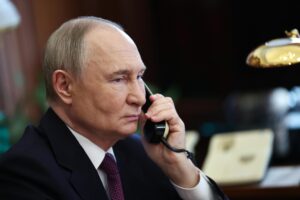After the US attack on Iran’s nuclear facilities over the weekend, Ali Khamenei regime resorted to Russia to find a way to respond to aggression. However, military aid was rejected by Moscow, signaling a growing weakening of the influence of Russian leader Vladimir Putin in the Middle East.
Despite the strategic partnership agreed between the friendly dictatorships earlier this year, including the defense area, the recent bombings suffered by Iran were accompanied by far by Putin, who summed up their support for a condemnatory rhetoric, but did little, in fact, to reduce damage to the Aiatollas regime.
The day after the US attack, Russia’s Foreign Ministry released a statement classifying military operations as “irresponsible”, demanding “the end of aggression.”
On Monday, two days after the bombing of three nuclear facilities in Iran, Putin received Iranian Foreign Minister Araqchi, and dealt with the case as an “unjustified aggression”, but did not mention any military support in his public comments.
On the contrary, it only suggested that countries resolve the situation through diplomacy and offered to mediation. However, Trump rejected the proposal, saying that he should first focus on solving the situation in Ukraine.
The previous week – when the attacks were still just a threat from the government of Donald Trump – Putin had already ruled out a possible Russian participation in the conflict, claiming that such an option is not contemplated in the strategic partnership agreement signed by the two countries earlier this year.
Iran was a key partner at the beginning of the Russian invasion in Ukraine, sending ammunition and thousands of drones to Moscow, which caused terrible damage to Ukrainian troops and civilians. However, the return of favor at a crucial time for Tehran seems unfeasible from Putin, as his army is bogged down in Ukraine and vulnerable to Western sanctions, which puts the Russian dictator in a sensitive situation to choose to support allies and maintain an unstable relationship with Israel and Trump.
This same conduct of Putin was observed in the fall of the Syrian dictator Bashar Al-Assad last year, which he received from Russia only asylum to himself and his family after the country was taken by insurgents.
Not so friends
To the The Wall Street Journal (WSJ), Fabrice Pothier, a senior leadership advisor to the North Atlantic Treaty organization said that “Russia is not as friendly with the dictators as it pretends: Putin often turns his back on his autocratic friends when they need him.”
Tehran’s biggest direct defeat in decades also puts in check the country’s alliance with other anti-occident partners: China and North Korea. If the three countries militarily supported Khamenei’s regime in response to the US and Israel, immediate damage could be reduced, but this would involve other fronts in the conflict, which these countries avoid.
The absence of help also exposes the divergence of interests between Iran and Allies, who received the nickname “Crink – China, Russia, Iran and North Korea – by some Western authorities. In recent years, these countries have approached with the objective of dealing with the western sanctions and undermine American influence in the world.
At the moment, Russia and China are conducting important negotiations with the Trump – Moscow government to resume a lost dialogue with the war in Ukraine and China to deal with its unstable economy – which makes involvement in conflicts away from home a sensitive theme. North Korea, in turn, has limited resources and is already involved in a foreign war in Russia, an important ally for Pyongyang.
Iranian reconstruction
Despite the lack of evident support at a critical moment, Iran should be accused in reconstructing its nuclear and military program.
According to WSJIran’s military losses open the doors to rearmament, which may come from the North Koreans, longtime suppliers from Tehran.
According to Bruce Bechtol, former US intelligence officer and a professor at Angelo State University, Texas, Kim Jong-un is probably willing to help Iran rebuild its nuclear program, although this help should be secret.
“No one makes underground tunnels better than North Koreans. Neither the Russians nor the Chinese, nor the Americans,” he said. Pyongyang helped project underground tunnels used in Iran’s nuclear facilities.
Already Russia and China involved hundreds of nuclear experts in the Persian country program of uranium enrichment. A 2008 UN report pointed out that the two powers helped Tehran develop their first uranium mine, Saghand.
Nikolay Kozhanov, Russian-Wandered Relations Specialist at the University of Qatar, explained WSJ That “leaving Iran without any support is very complicated for Moscow, but Moscow’s main task at the moment is not to harm relationships with anyone.”











